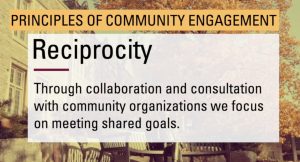Chapter 8: Reciprocity

Reciprocity refers to how students, faculty, community partners, and other stakeholders should seek to generate mutual benefit. Mutual benefit is about creating value for all stakeholders participating in community-engaged learning. In this regard, value is a function of the benefit a stakeholder receives from participating minus the costs associated with doing so. Stakeholders differ in the benefit that is generated.
- Students are often looking to develop professional skills such as managing meetings and writing professional emails as well as gaining practical experience to improve their chances of securing employment
- Community partners, on the other hand, may want to tap into the expertise of university students and faculty, secure volunteer engagement, or get some help starting or advancing a project
- Faculty members are frequently excited by the opportunity to create really meaningful learning opportunities for students, generate opportunities for research, and help community partners advance their organizations
Many community partners operate on slim budgets and time away from their day-to-day can have negative impacts on their meeting organizational objectives.These benefits need to be weighed against the costs, often in terms of time and focus of all participants. In particular, many community partners operate on slim budgets and time away from their day-to-day can have negative impacts on their meeting organizational objectives. There are many simple ways to decrease the costs of community-engaged learning. For example, students can run effective meetings with agendas and respected timelines and reduce email clutter. Faculty can effectively prepare students for volunteer placement opportunities and clearly scope project-based initiatives. Community partners can engage early with student groups and provide timely feedback to facilitate the most effective project outcomes.
Generating more value — in other words — being more reciprocal, is a shared responsibility across all stakeholders. Faculty, students, and community partners must all look for ways to either create more benefits and/or make engaging in community-engaged learning easier. To do so, partners should participate in purposeful goal setting which identifies important outcomes and drives value through cooperation, mutual understanding, accommodation and collaboration.
Gabriella talks about her experience of Reciprocity in this short video clip (access to closed captions in toolbar):
Watch the whole 27-minute video, “The Principles of Community Engagement Module” [27:38].
Checklist: Reciprocity
Here are some questions you might ask yourself when considering the principle of reciprocity in your community engaged learning experience:
- How will I make sure that my engagement contributes something meaningful to this community?
- How have I considered the community partners’ needs and expectations in my project plan?
- What can I do to ensure that I draw on community partners’ time appropriately?
- What skills do I hope to develop throughout this experience? How can my participation in this project enhance those skills?

